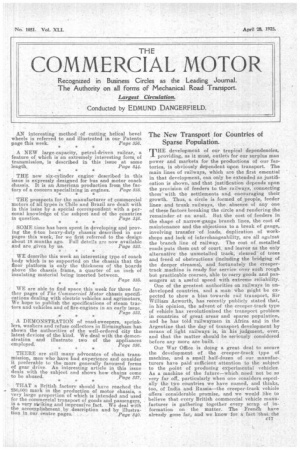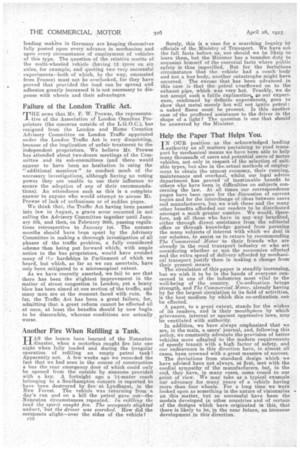The New Transport for Countries of Sparse Population. •
Page 1

Page 2

If you've noticed an error in this article please click here to report it so we can fix it.
THE development of our tropical dependencies, providing, as it must, outlets for our surplus man power and markets for the productions of our fa.etories, is obviously dependent upon transport. The main lines of railways, which are the first essential in that development, can only be extended as justification is shown, and that justification depends upon the provision of feeders to the railways, connecting them' with the settlements and encouraging their growth. Thus, a circle is formed. of people, feeder lines and trunk railways, the. absenee of any one of these factors breaking the circle and rendering the remainder of no avail. But the cost of feeders in the shape of narrow-gauge branch lines, the cost of maintenance and the objections to a break of gauge, involving transfer of loads, duplication of workshops and lack of interchangeability, are all against the branch line of railway. The cost of metalled roads puts them out of court, and leaves as the only alternative the unmetalled track, cleared of trees and freed of obstructions (including the bridging of the deeper streams), and fortunately the creepertrack machine is ready for service over such rough but practicable courses, able to carry goods and passengers at a useful speed with extreme reliability.
One of the greatest authorities on railways in undeveloped countries, and a man Who might. be expected to show a bias towards rail transport, Sir William Acworth, has recently publicly stated that, in his opinion, the advent of the creeper-track type of vehicle has revolutionized the transport problem in countries of great areas and sparse population, and he has told railwaymen in Africa and in the Argentine that the day of transport development by means of light railways is, in his judgment, over, and that the matter should be seriously considered before any more are built.
Our War Office is doing a great deal to secure the development of the creeper-track type of machine, and a small half-dozen of our manufacturers have paid sufficient attention to the subject to the point of producing experimental vehicles. As a machine of the future—which need not he so very far off,, particularly when one considers especially the two countries we have named, and thinks, too, of India and Russia--the creeper-track vehicle offers considerable promise, and we would like to believe that every British commercial vehicle manufacturer is gathering together every scrap of information on the matter. The Freneh have akeady gone far, and we know for. a 'fact -that the leading mak°ers in Germany are keeping themselves fully posted upon every advance in mechanism and upon every circumstance of employment of vehicles of this type. The question of the relative merits of the multi-wheeled vehicle (having 12 tyres on six axles, for example, and quoting two very successful experiments—both of which, by the way, emanated from France) must not be overlooked, for they have proved that provided the load can be spread and adhesion greatly increased it is not necessary to dispense with wheels and their advantages.
Failure of the London Traffic Act.
rTIHE news that Mr. F. W. Prowse, the representa tive of the Association of London Omnibus Proprietors (the concerns outside of the L.G.O.C.), has resigned from the London and Home Counties Advisory Committee on London Traffic appointed under the London Traffic Act is very disquieting, because of the implication of unfair treatment to the independent proprietors. We believe Mr. Prowse has attended about two-dozen meetings of the Committee and its sub-committees (and there would appear to have been no hesitation in using the "additional members" to conduct much of the necessary investigations, although having no voting power they are unable to use their influence to secure the adoption of any of their recommendations). An attendance such as this is a .complete answer to anyone who would attempt to accuse Mr. Prowse of lack of enthusiasm or of sudden pique. We think that, the Traffic Act, having been passed into law in August, a grave error occurred in not calling the Advisory Committee together until January Sth, and then, on February 20th, passing regulations retrospective to January 1st,. The autumn months should have been spent by the Advisory Committee in making a thorough investigation of all phases of the traffic problem, a fully considered scheme then being put forward which, with ample notice to the bus proprietors, would have avoided many of 0:e hardships in Parliament of which we heard, but which, so far as we can ascertain, have only been mitigated to a microscopical extent. As we have recently asserted, we fail to see that there has been the slightest improvement in the matter of street congestion in London, yet a heavy blow has been aimed at one section of the traffic, and many men are at the moment faced with ruin. So far, the Traffic Act has been a great failure, for, ad:siitting that a great reform cannot be effected all at once at least the benefits slhould by now begin to be discernible, whereas conditions are actually worse.
Another Fire When Refilling a Tank.
HAdiSsasttheer lwests.eonn abeenotolerabrunsedcauogfuthfiereNluaneatoonne night when 'fully loaded and during the irregular operation of refilling an empty petrol tank? Apparently not. A few weeks ago we recorded the fact that we had seen in the course of construction a bus the rear emergency door of which could only be opened from the outside by someone provided with a key. A fortnight ago a 14-seater coach belonging to a Southampton concern it reported to have been destroyed by fire at Lyndhurst, in the New Forest. The vehicle was returning from a day's run and on a hill the petrol gave out—the Nuneaton circumstances repeated. In refilling the tank the spirit caught fire. The occupants alighted unhurt, but the driver was scorched. How did the occupants alight—over the sides of the vehicle? Surely, this is a case for a searching inquiry by officials of the Ministry of Transport. We have not the full facts before us, nor should we be likely to learn them, but the Minister has a bounden duty to acquaint himself of the essential facts where public safety is thus imperilled. But for the fortuitous circumstance that the vehicle had a coach body and not a bus body, another catastrophe might have occurred. The excuse that has been advanced in this case is that the petrol overflowed on to the exhaust pipe, which was very hot. Frankly, we do not accept such a, futile explanationLi as our experience, confirmed by definite experiments, goes to show that metal merely hot will not ignite petrol: • a naked flame must be present. Is this another case of the proffered assistance to the driver in the shape of a light? The question is one that should be answered by the Minister.
Help the Paper That Helps You.
IN OUR position as the acknowledged leading authority on all matters pertaining to road transport by mechanical means we have been able to help many thousands of users and potential users of motor vehicles, not only in respect of the selection of suitable types, but also in the. actual methods of employment to obtain the utmost economy, their running, maintenance and overhaul, whilst our legal advice department has proved • of inestimable benefit to others who have been in difficulties on subjects concerning the law. At all times our correspondence pages have been open for the discussion of current topics and for the interchange of ideas between users and manufacturers, but we wish these and the many other benefits afforded our readers to be distributed amongst a much greater number. We Would, therefore, ask all those who have in any way benefited, either through direct assistance from the editorial office or through knowledge gained from perusing the many subjects of interest with which we deal in our columns, to assist us in return by recommending The Commercial Motor to their friends who are already in the road transport industry or who are considering whether or not the economies effected and the extra speed of delivery afforded by mechanical transport justify them in making a change from their present means. The circulation of this paper is steadily increasing, but we wish it to be in the hands of everyone concerned in one of the industries most vital to the well-being of the country. Co-ordination brings strength, and The Commercial Motor, already having by far the largest circulation in its field of activities, is the best medium by Which this co-ordination can be effected. A paper, to a great extent, stands for the wishes of its readers, and is their mouthpiece by which grievances internal or against oppressive laws, may be ventilated with authority. In addition, we have always emphasized that we are in the main, a users' journal, and, following this policy, we constantly advocate the provision of better vehicles more adapted to the modern requirements of speedy transit with a. high factor of safety, and our endeavours in this direction have, in almost all cases, been crowned with a great measure of success. The deviations from standard design which we have advised have not always, at first, met with the cordial sympathy of the manufacturers, but, in the end, they have, in many cases, come round to our point of view. We may take as a typical example our advocacy for many years of a vehicle having more than four wheels. For a long time we were looked upon as something in the nature of visionaries on this matter, but so successful have been the models developed in other countries and of certain of the designs which have originated in this, that there is likely to be, in the near future, an immensedevelopment in this direction.
































